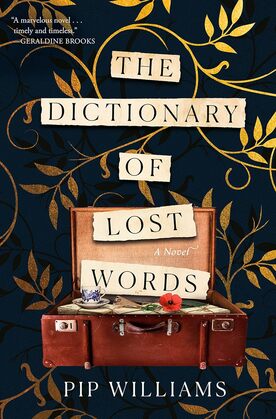|
Another gorgeous cover! The Dictionary of Lost Words by Pip Williams is a historical novel recommended to me by a friend. It's about a woman and her contributions to the Oxford English Dictionary in the late 1800s - early 1900s. Being an etymology nerd, and knowing it had a feminist bent, I was excited to dive in.
The novel focuses on Esme, daughter of one of the men tasked with collecting and organizing words for the dictionary. After her mother died, she spent most of her time with her father in a place called the Scriptorium, where the words were sorted and compiled. Esme found a slip of paper on the floor with a word and realized it had been lost and decided to keep it. As she grew older, she learned that some words weren't lost by mistake, but left out on purpose--often words related to the poor and especially women. She must decide what to do about it, continue to help a dictionary that loses words on purpose or save those words left behind. This book had a lot of interesting elements. I'd never thought about what it took to make the first dictionary or the thought process behind words to include or exclude. I thought Esme lived during an interesting time in England, which included the movement for women's suffrage and WWI. Something frustrating about the book was that Esme took a long time to start on her character arc, so the beginning felt too slow for me. However, a lot of what was happening around Esme was interesting enough that I kept going. Overall this book was an interesting read. This book is for you if you like Victorian-era historical fiction, etymology, and early 20th century feminism. It's not for you if you are looking for a super active character, if you're looking for a romance, of if you're not in the headspace to read about pregnancy/adoption. Have you read the Dictionary of Lost Words? What other historical novels have you enjoyed? Let's discuss in the comments!
0 Comments
Leave a Reply. |
Archives
April 2024
Categories
All
|


 RSS Feed
RSS Feed